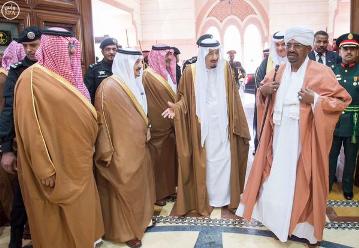Sudan’s foreign policy: Pragmatism wins over ideology
April 4, 2015 (KHARTOUM) – Sudan’s foreign relations have witnessed a remarkable shift since last fall particularly in its rapprochement with the Arab Gulf states following years of chilly ties.

Sudan has regularly allowed Iranian warships to dock in Port Sudan across Saudi Arabia drawing concern by the United States and its allies in the Gulf.
However, it appears that Sudan, driven by its economic woes, has recently chosen to adopt a pragmatic approach by moving away from Iran and forging an unwritten alliance with the Gulf.
Long before that, there were signs of discord within the ranks of the Sudanese government regarding ties with Iran.
Those differences surfaced in November 2012 during a TV interview with the foreign minister Ali Karti who publicly criticized his government’s decision to receive Iranian vessels.
“The view of the Sudanese foreign ministry that these ships should not [be allowed] to dock and we spoke with the Defense Minister and submitted our opinion to the President of the Republic and the decision [was made] that these ships are not to dock [in Port Sudan]” he said at the time.
Karti said that he found about Iranian warships visiting the country in a later instance “through the media”.
He reiterated that had he been consulted he would have again advised against receiving the Iranian navy ships.
Karti also confirmed reports that he warned his party during a meeting held in August 2012 that they will need to make a choice between strengthening ties with Gulf states or with Iran.
Senior diplomatic sources told Sudan Tribune that the foreign ministry has always been convinced that any rapprochement with Iran would harm Sudan’s ties with the Gulf states.
They disclosed that influential figures within the ministry continued to warn the presidency against this policy in the long run, saying that Karti has made the case that Sudan’s real interest lies in distancing itself from Iran.
Several reports have indicated Saudi Arabia’s dissatisfaction with Sudan’s closed ties with Iran, saying the largest Gulf nation is wary of the Iranian influence in the Middle East, fearing the Shiite-led country is seeking regional dominance that will stir sectarian tensions.
This Saudi resentment became obvious when Riyadh, in August 2013, blocked a plane carrying the Sudanese president from entering its airspace en route to Iran to attend the inauguration ceremony of the new president Hassan Rouhani.
Riyadh blamed the incident on not being notified on Bashir’s planned trip beforehand to obtain the necessary clearance.
It was not long until the UAE followed suit, making the clearest signal of its dissatisfaction with Khartoum.
In September 2013, UAE minister of state for foreign affairs, Anwar Gargash, was quick to issue a statement expressing concern over the violent clashes between Sudanese security and protestors who took to the streets in opposition of the government’s decision to cut fuel subsidies.
He said that the UAE was “deeply concerned” about the “violent and unjustified” dealings with these events and the impact it has on the Sudanese society.
The rare and extremely unusual comment by UAE on a domestic event in Sudan was another sign that relations between the two countries were not in a good place.
Amid this tense climate, Sudan’s foreign ministry continued its efforts to convince the presidency to distance itself from the Iranian axis and mend ties with Gulf states and began to seek to open diplomatic channels with the latter.
Foreign ministry efforts culminated in the government’s decision to shut down Iranian cultural centers in the country in September 2014.
The move represented a clear victory for the diplomatic vision over the security and military camp within the government. It also signaled to Gulf states that a new phase is forthcoming in Sudan.
The Gulf states, quickly responded to Khartoum’s gesture by reportedly offering investment opportunities and embarking to the lift of ban on banking transfers.
Shortly after, the Sudanese president Omer Hassan al-Bashir flew to Saudi Arabia and met with the then crown prince Salman Bin Abdel-Aziz.
The same diplomatic sources told Sudan Tribune that the visit discussed ways for promoting bilateral ties, saying that Bashir had clearly warned Salman against the Houthi danger and the volatile situation in Yemen.
According to the sources, Bashir expressed concern over repercussions of the situation in Yemen on the security of the Red Sea, stressing that Sudan does not tolerate any threats to its sole gateway to the sea.
This point explains king Salman’s keenness to include Sudan in the coalition against the Houthis and it also justifies Bashir’s harsh tone and unwavering support to the war against them.
As a result of these diplomatic efforts, Sudan formally announced its participation in the offensive codenamed “Operation Firmness Storm” which targets Houthi militants allied with Iran, who have taken control of Yemen’s capital Sana’a since September 2014.
Sudan said it has put four aircraft under Saudi command and is prepared to deploy 6,000 troops against the Houthi rebels.
The last move shows that the security and military camp within the Sudanese government has come to terms with the diplomatic vision calling for joining the Gulf states and keeping away from Iran in order to better serve Sudan’s interests.
(ST)
